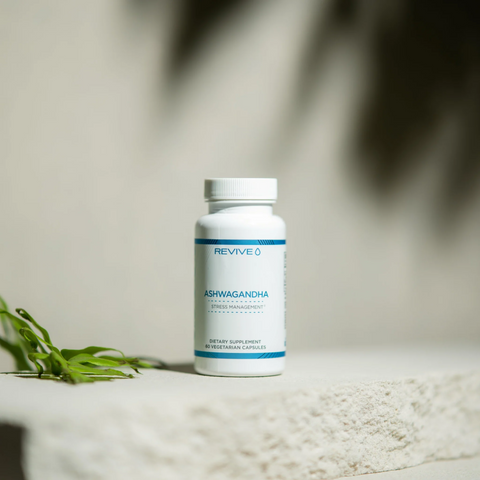The Best Ashwagandha Supplement in 2024
If you’re new to the world of supplements, you might have never heard of ashwagandha — and don’t worry, you’re not alone.
Ashwagandha, an herb that’s well-known for relieving stress, fighting insomnia, and reducing anxiety, has gained a lot of attention because of its potential health benefits. It’s commonly used in Ayurvedic medicine, which is a holistic approach to health from India.

Ashwagandha root is becoming more popular and can be found in many dietary supplements these days. Using ashwagandha to treat stress and anxiety is an example of Integrative medicine, which broadens our options beyond Western medicine by including evidence-based treatments from Eastern and alternative medicine.
Ashwagandha is a well-researched plant and is mainly categorized as an adaptogen, which means it helps the body manage stress more effectively. While ashwagandha can be helpful for many people, like any herb or supplement, it works best when combined with changes in diet and regular exercise.
In this article, we talk about the best ashwagandha supplement, then dive into exploring the benefits of ashwagandha, so stick around!
The Best Ashwagandha Supplement
When it comes to the best ashwagandha supplement, we recommend Revive MD’s Ashwagandha KSM-66. This supplement includes a high-quality organic ashwagandha root extract that's standardized to contain at least 5% withanolides. This powerful blend provides plenty of health benefits, including reducing stress and improving mood.

This supplement, in particular, stands out because it has a high concentration of withanolides. This makes Ashwagandha KSM-66 more effective when it comes to fighting stress and anxiety, improving stamina, and strengthening mental clarity. However, as with all dietary supplements, Ashwagandha KSM-66 does come with some potential side effects (most notably gastrointestinal discomfort). These side effects are rare, but it’s still important to be aware of them.
A significant advantage of KSM-66 is its potential to increase testosterone levels, which is especially good news for men who are dealing with fertility issues. Although further research is needed to confirm its effects on the wider population, this feature is something to write home about.
This supplement's formulation is enriched with Bioperine — a patented extract of black pepper fruit, and magnesium, both of which add to its effectiveness. Bioperine helps with nutrient absorption, while magnesium supports muscle and nerve function, along with energy production.
What Is Ashwagandha?
Ashwagandha, a plant originating from Asia and Africa and often referred to as “Indian ginseng,” has several parts with different active compounds. The root, traditionally used in medicine, is ground into a powder for consumption. Its name, "ashwagandha," is derived from the Sanskrit word for horse, possibly due to its scent or its reputed ability to improve stamina.
So, what’s so great about ashwagandha? In Ayurvedic medicine, it's been used to improve energy, alleviate inflammation, pain, and anxiety, and promote good health in general. Ayurvedic medicine emphasizes balance between body, mind, spirit, and environment through proper nutrition, regular exercise, mindfulness, and herbs like ashwagandha.
As you’re probably well aware, modern life is stressful, and this stress can trigger physical and mental health issues. Stress prompts the body to increase cortisol levels, which can lead to a heightened heart rate, rapid breathing, and glucose production for more energy.
This response, called "fight or flight," can become chronic with ongoing stressors. Chronic stress contributes to persistent inflammation and raises the risk of developing conditions like obesity, diabetes, hypertension, heart disease, stroke, cancer, fibromyalgia, and osteoporosis.
The Benefits of Ashwagandha
If you’re looking for the best ashwagandha supplement, you may already be aware of this adaptogen’s main benefits. Still, though, the benefits of ashwagandha are wide-ranging and worth talking about. Let’s go over the main benefits of ashwagandha in detail below:
Reduces stress and anxiety
Ashwagandha seems to regulate various stress mediators, including heat shock proteins (Hsp70), cortisol, and stress-activated c-Jun N-terminal protein kinase (JNK-1). It also diminishes the activity of the hypothalamic-pituitary-adrenal (HPA) axis, a system responsible for managing stress responses in the body.

Research shows that Ashwagandha supplements may alleviate stress and anxiety. In one study involving 58 participants, those who consumed either 250 or 600 mg of ashwagandha extract daily for 8 weeks reported notable reductions in perceived stress levels and cortisol levels compared to those taking a placebo. Additionally, the ashwagandha group experienced improvements in sleep quality compared to the placebo group.
In another study with 60 participants, those who took 240 mg of ashwagandha extract daily for 60 days showed significant reductions in anxiety compared to those who received a placebo. These findings suggest that ashwagandha could be a beneficial supplement for managing stress and anxiety, however, more research is needed.
Reduces blood sugar levels
There's some evidence suggesting that ashwagandha could offer benefits to people with diabetes or high blood sugar levels. A review of 24 studies, including 5 clinical trials involving people with diabetes, discovered that ashwagandha treatment lowered blood sugar levels, hemoglobin A1c (HbA1c), insulin, blood lipids, and oxidative stress.
This effect might be attributed to specific compounds found in ashwagandha, such as withaferin A (WA), which has strong anti-diabetic properties and could help with prompting cells to absorb glucose from the bloodstream. However, current research is limited, and further clinical studies will be necessary to confirm these findings.
Improves brain function
Taking ashwagandha might have positive effects on cognitive abilities. A review of five clinical studies suggests early signs that ashwagandha could improve cognitive function, particularly in certain groups like older adults dealing with mild cognitive impairment and people with schizophrenia. Improved cognitive functions, in this case, included executive functioning, attention, reaction time, and performance on cognitive tasks.
In a study involving 50 adults, those who took 600 mg of ashwagandha extract daily for 8 weeks experienced notable improvements in immediate and overall memory, attention, and information-processing speed compared to those taking a placebo. Researchers observed that the compounds present in ashwagandha possess antioxidant properties, which could be beneficial for cognitive health.
Improves athletic performance
Studies show that ashwagandha could positively impact athletic performance, so if your daily routine involves hitting the gym, you may want to start taking an ashwagandha supplement. One study, in which people took ashwagandha doses ranging from 120 mg to 1,250 mg per day, suggests that the herb may improve physical performance, including strength and how much oxygen is used while exercising.

Another analysis found that ashwagandha intake significantly improved maximum oxygen consumption (VO2 max) in both healthy adults and athletes. VO2 max measures the maximum amount of oxygen that a person can use during intense physical activity. It’s important to have good VO2 max levels since low VO2 max has been linked to an increased mortality rate.
Improves sleep
A lot of people take ashwagandha to improve their sleep quality, and some evidence supports its effectiveness in addressing sleep issues. For example, a study involving 50 adults aged 65-80 discovered that taking 600 mg of ashwagandha root daily for 12 weeks notably improved both sleep quality and mental alertness upon waking compared to a placebo.
Also, a review of five studies found that ashwagandha demonstrated a slight yet still noteworthy positive impact on sleep quality, anxiety reduction, and increased alertness upon waking up. These effects were particularly noticeable in people struggling with insomnia and those who took more than 600 mg of ashwagandha daily for at least 8 weeks.
Who Should Not Take Ashwagandha Supplements?
Ashwagandha has been proven to be effective in addressing health issues like anxiety, low testosterone, diabetes, and autoimmune diseases. But is it safe for everyone, and can you use it daily?
Generally, ashwagandha is considered to be quite safe. However, since research on herbal remedies is limited and ashwagandha products can differ depending on where you get them from, it's important to be cautious and consult a healthcare professional before taking ashwagandha supplements.
Although adverse effects are rare, some people may experience gastrointestinal discomfort, diarrhea, nausea, vomiting, and drowsiness with high doses of ashwagandha. Small studies on ashwagandha have reported mild side effects, such as nasal congestion, cough, cold, constipation, changes in appetite, and increased libido. Certain groups of people should avoid ashwagandha:
Pregnant women or breastfeeding women
Ashwagandha may be unsafe during pregnancy since it could increase the risk of miscarriage. Its effects on breastfeeding are not well understood, so it's best to avoid it.
People with diabetes
While ashwagandha might lower blood sugar levels, it could interact with diabetes medications, causing blood sugar levels to drop dangerously low.
People with high blood pressure
Ashwagandha's blood pressure-lowering effect could pose risks for those with high or low blood pressure, especially when combined with prescription medications.
People undergoing surgery
Ashwagandha may have a sedating effect, which can interact with anesthesia and other drugs used during surgery. It's a good idea to stop taking ashwagandha at least two weeks before surgery and inform your surgeon about all medications and supplements you're taking.
What Is the Correct Way to Take Ashwagandha?
Most people choose to ashwagandha in capsule or powder form. As far as when to take it, you can take ashwagandha at any point during the day. Some prefer to incorporate it into their evening routine since it’s been proven to help with sleep issues. Others find that it fits better in their morning schedule (i.e. some people might take it before going to the gym, since it can improve physical performance).
As ashwagandha typically requires time to take effect, you can choose the timing that works best for you. However, if you experience any stomach discomfort, you might want to consider taking it with food or before bed. Again, you should talk to your doctor before you start taking ashwagandha supplements. It’s always better to be safe than sorry!
Enjoy the Benefits of Ashwagandha With Revive’s Ashwagandha Supplement
As you can see, ashwagandha comes with plenty of health benefits, and when it comes to the best ashwagandha supplement out there, Revive MD has got your back! If you’re dealing with stress, anxiety, or insomnia, our ashwagandha supplement may be exactly what you’ve been looking for.
Feel free to reach out if you have any questions or concerns about this supplement (or any of our supplements). Our team of experts is always happy to help!
The information being presented in this blog is intended to be used as educational or resource information only. It is not intended to be a substitute for medical advice from your healthcare provider. This content should not be used for the diagnosis or treatment of any medical condition. If you have any questions or concerns about your health, please contact your healthcare provider. You should call 911 for all medical emergencies. Revive MD is not liable for any advice or information provided on this blog, which advice or information is provided on an “as-is” basis, and assumes no liability for diagnosis, treatment, decisions, or actions made in reliance upon any advice or information contained on this blog. No warranties, express or implied, are made on the information that is provided.
